2020年中考英语一轮教材复习课件:九年级全册units9-10
文档属性
| 名称 | 2020年中考英语一轮教材复习课件:九年级全册units9-10 |
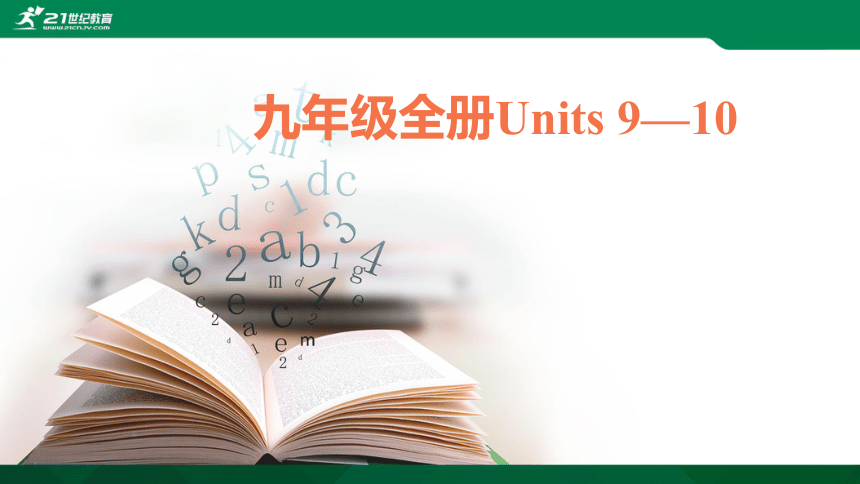
|
|
| 格式 | zip | ||
| 文件大小 | 1.7MB | ||
| 资源类型 | 试卷 | ||
| 版本资源 | 人教新目标(Go for it)版 | ||
| 科目 | 英语 | ||
| 更新时间 | 2020-02-21 00:00:00 | ||
图片预览

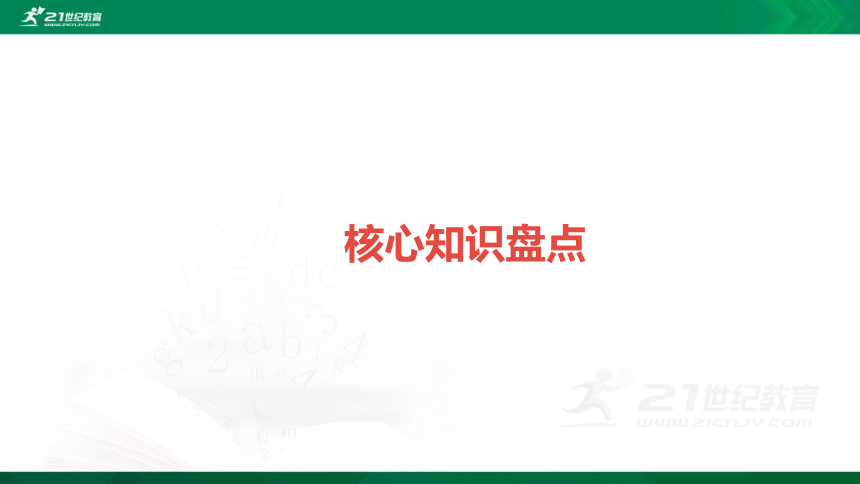
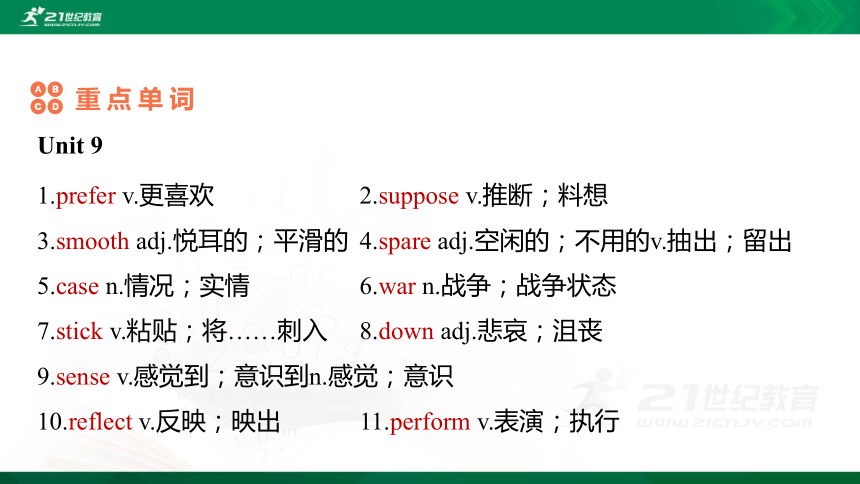
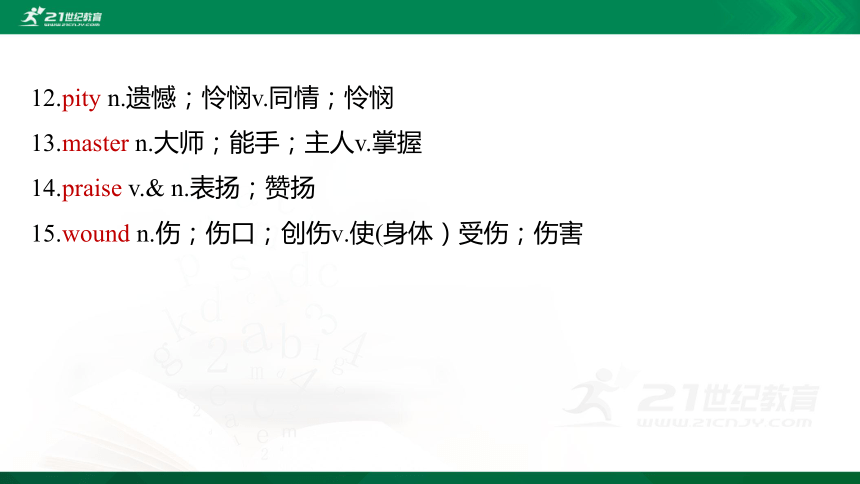
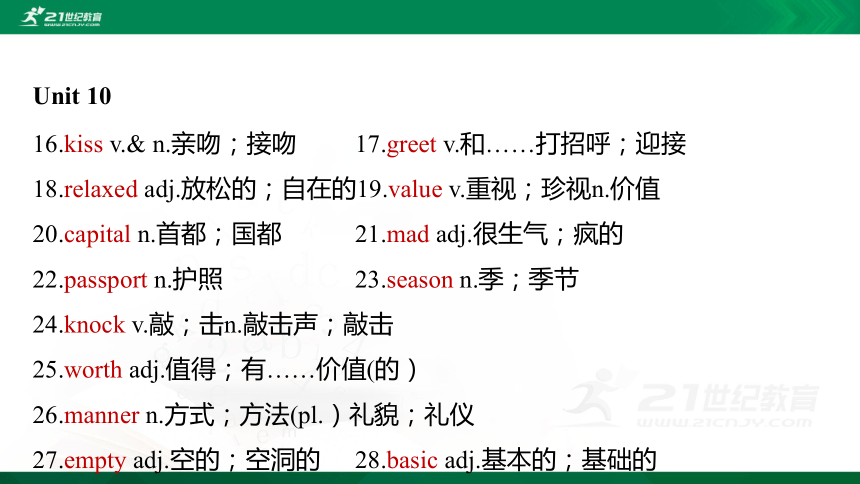
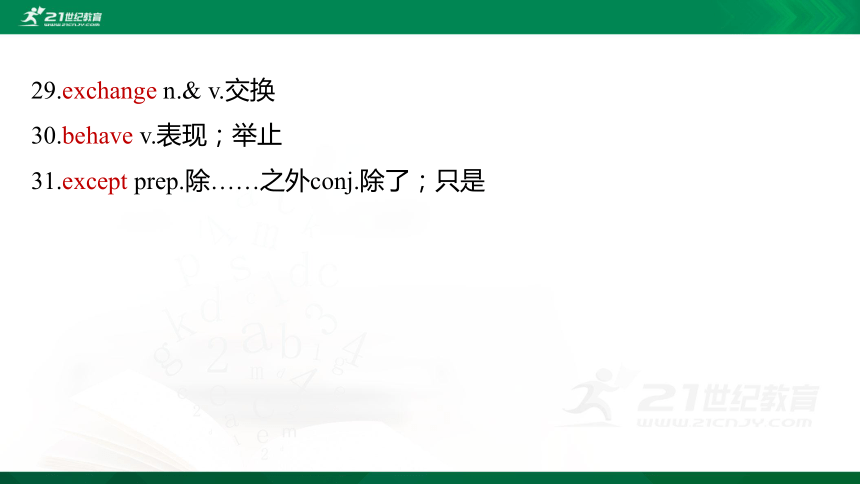
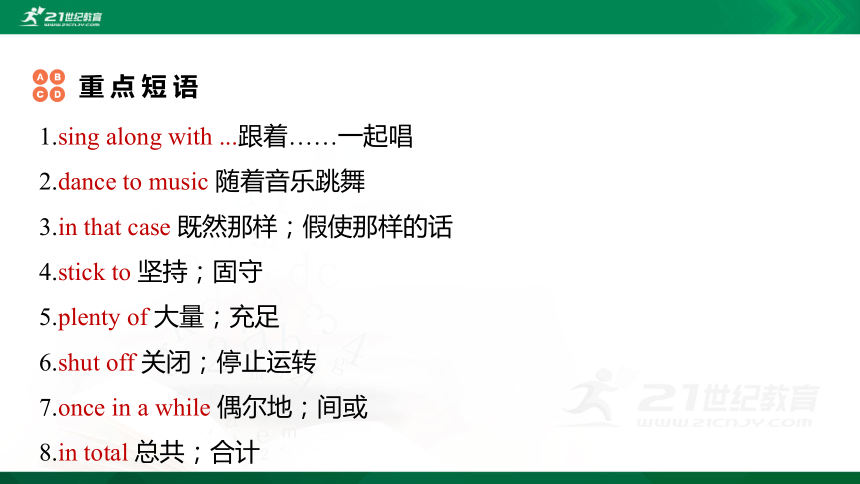
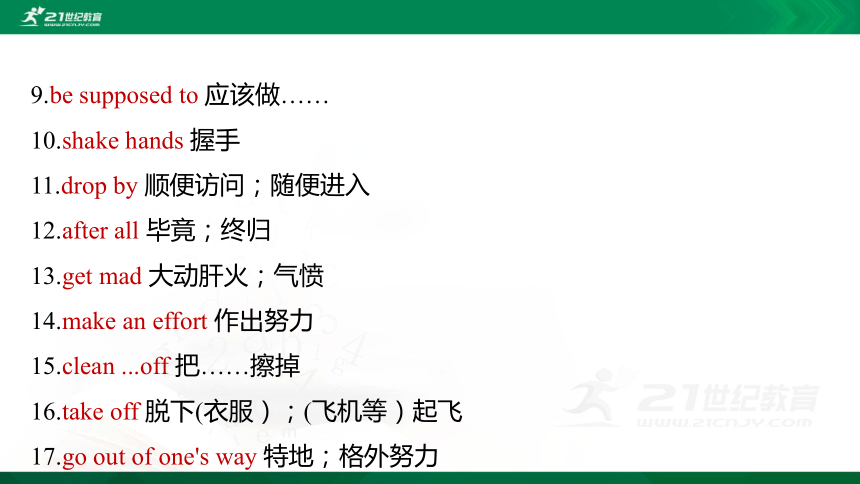
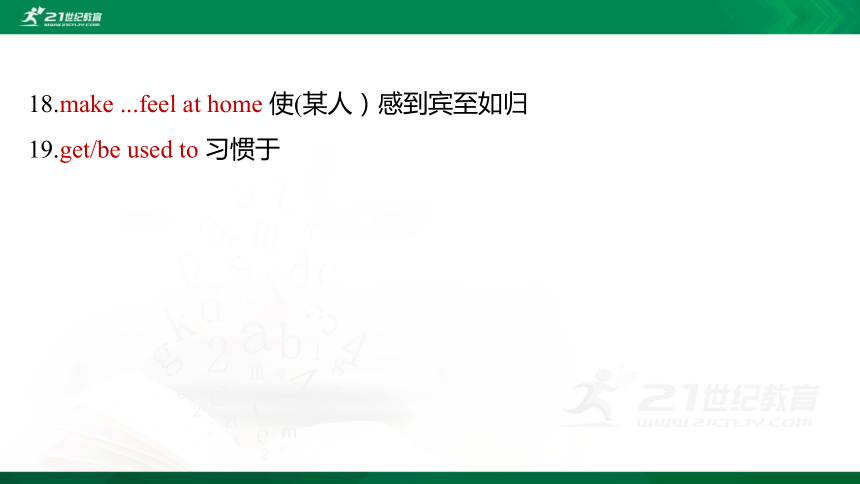
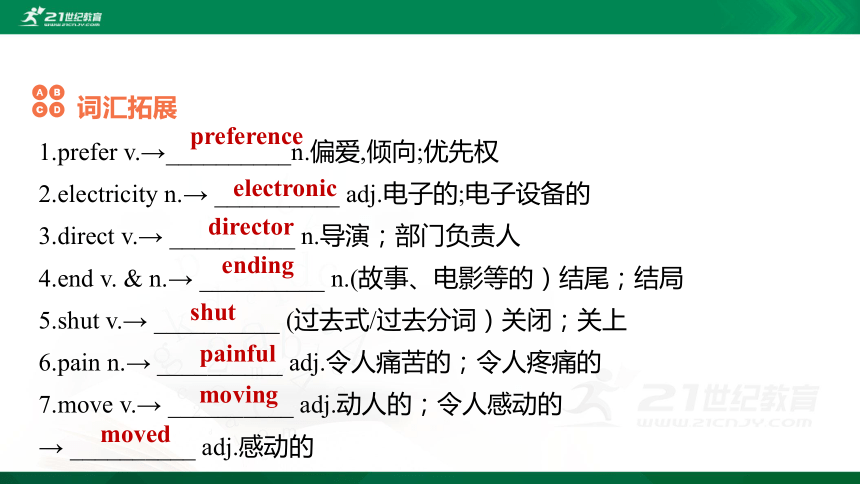
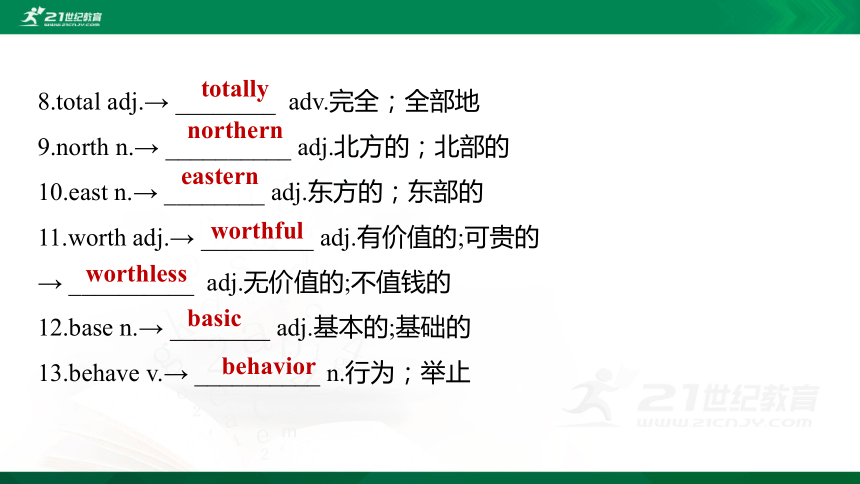

文档简介
(共57张PPT)
九年级全册Units 9—10
核心知识盘点
1.prefer v.更喜欢 2.suppose v.推断;料想
3.smooth adj.悦耳的;平滑的 4.spare adj.空闲的;不用的v.抽出;留出
5.case n.情况;实情 6.war n.战争;战争状态
7.stick v.粘贴;将……刺入 8.down adj.悲哀;沮丧
9.sense v.感觉到;意识到n.感觉;意识
10.reflect v.反映;映出 11.perform v.表演;执行
重 点 单 词
Unit 9
12.pity n.遗憾;怜悯v.同情;怜悯
13.master n.大师;能手;主人v.掌握
14.praise v.& n.表扬;赞扬
15.wound n.伤;伤口;创伤v.使(身体)受伤;伤害
Unit 10
16.kiss v.& n.亲吻;接吻 17.greet v.和……打招呼;迎接
18.relaxed adj.放松的;自在的19.value v.重视;珍视n.价值
20.capital n.首都;国都 21.mad adj.很生气;疯的
22.passport n.护照 23.season n.季;季节
24.knock v.敲;击n.敲击声;敲击
25.worth adj.值得;有……价值(的)
26.manner n.方式;方法(pl.)礼貌;礼仪
27.empty adj.空的;空洞的 28.basic adj.基本的;基础的
29.exchange n.& v.交换
30.behave v.表现;举止
31.except prep.除……之外conj.除了;只是
1.sing along with ...跟着……一起唱
2.dance to music 随着音乐跳舞
3.in that case 既然那样;假使那样的话
4.stick to 坚持;固守
5.plenty of 大量;充足
6.shut off 关闭;停止运转
7.once in a while 偶尔地;间或
8.in total 总共;合计
重 点 短 语
9.be supposed to 应该做……
10.shake hands 握手
11.drop by 顺便访问;随便进入
12.after all 毕竟;终归
13.get mad 大动肝火;气愤
14.make an effort 作出努力
15.clean ...off 把……擦掉
16.take off 脱下(衣服);(飞机等)起飞
17.go out of one's way 特地;格外努力
18.make ...feel at home 使(某人)感到宾至如归
19.get/be used to 习惯于
1.prefer v.→__________n.偏爱,倾向;优先权
2.electricity n.→ __________ adj.电子的;电子设备的
3.direct v.→ __________ n.导演;部门负责人
4.end v. & n.→ __________ n.(故事、电影等的)结尾;结局
5.shut v.→ __________ (过去式/过去分词)关闭;关上
6.pain n.→ __________ adj.令人痛苦的;令人疼痛的
7.move v.→ __________ adj.动人的;令人感动的
→ __________ adj.感动的
词汇拓展
preference
electronic
director
ending
shut
painful
moving
moved
8.total adj.→ ________ adv.完全;全部地
9.north n.→ __________ adj.北方的;北部的
10.east n.→ ________ adj.东方的;东部的
11.worth adj.→ _________ adj.有价值的;可贵的
→ __________ adj.无价值的;不值钱的
12.base n.→ ________ adj.基本的;基础的
13.behave v.→ __________ n.行为;举止
totally
northern
eastern
worthful
worthless
basic
behavior
1.While some people _______ _______ only one kind of movie,I like to watch different kinds ___________ _______ how I feel that day.
尽管有些人坚持只看一种类型的电影,但我喜欢看不同类型的,这取决于我那天的心情。
2.It was one of _______ _______ _______ _______ of music _______ _______ ever _______ .
它是我听过的最动人的乐曲之一。
重 点 句 型
stick
to
depending
on
the
most
moving
pieces
that
I've
heard
3. ______ ______ ______ ______ that only six pieces of music ______ ______ were recorded for the future world to hear,but his ________ continues to this day.
遗憾的是,一共只有六首曲子被录了下来得以传世,但时至今日,他依旧颇受欢迎。
4.We ______ the time we ______ ______ our family and friends in our everyday lives.
我们特别珍惜平日生活中和家人、朋友在一起的时光。
It
is
a
pity
in
total
popularity
value
spend
with
5.It's very _________ to _________ _________ waiting .
让别人等是不礼貌的。
6.I _________ find French customs so strange _________ .
我不再觉得法国的习俗那么奇怪了。
impolite
keep
others
don't
anymore
谈论文艺喜好
1.—What kind of music do you like?
你喜欢哪种音乐?
—I love music that/which I can sing along with.
我喜欢我能跟着一起唱的音乐。
2.—What kind of movies do you like?
你喜欢哪种电影?
—I prefer movies that/which give me something to think about.
我更喜欢能让我有所思考的电影。
情 景 交 际
谈论习俗和应该做什么
3.—What are you supposed to do when you meet someone for the first time?
当你第一次见到某人时应该做什么?
—You're supposed to shake hands.You're not supposed to kiss.
你应该握手。你不应该亲吻。
4.—Am I supposed to wear jeans?
我应该穿牛仔裤吗?
—No,you're expected to wear a suit and tie.
不,你该穿西装,打领带。
语 法
1.that,who和which引导的定语从句
2.be supposed to的用法
3.be expected to的用法
4.It is+adj.+to do句型
话 题
Unit 9 音乐和电影
Unit 10 风俗习惯
教材考点解析
I prefer music that has great lyrics.
我更喜欢歌词很棒的音乐。(Unit 9 P65)
【点拨】prefer用作动词,意为“更喜欢”,相当于like ...better。其后可接名词、动名词或不定式。其常见用法如下:
考点一
(注:②、③中的to为介词,④、⑤中的to为不定式符号。)
你更喜欢什么,茶还是咖啡?
I prefer apples to pears.
比起梨,我更喜欢苹果。
Tom prefers reading to watching TV.
汤姆喜欢阅读胜过看电视。
The old man prefers to live in the countryside.
这位老人更喜欢住在乡下。
He preferred to stay at home rather than go out.
他宁愿待在家里也不愿出去。
( )1.(2019·天水)Businessmen prefer ______ e-mails to communicate with each other rather than phone calls.
A.write;make B.to write;make C.write;to make
( )2.Jack _____ painting ______ playing games.
A.prefers;than B.would rather;than C.prefers;to
B
学以致用
C
You're supposed to shake hands.
你应当握手。(Unit 10 P73)
【点拨】be (not) supposed to do sth.意为“(按规定、习惯、安排等)应当,应该”,当主语不同时,含义不同,具体区别如下:
(1)当主语为“人”时,be (not) supposed to do sth.意为“(不)应当做某事”,它可以用来表示劝告、建议、义务、责任等,相当于should (not) do sth.。如:
You are supposed to give your seat to the old on the bus.
在公交车上你应当给老年人让座。
考点二
(2)当主语为“物”时,be (not) supposed to do sth.,意为“本应、本该……”,用于表示“某事本应该发生而没有发生”。如:
The train was supposed to arrive an hour ago.
火车本应在一小时之前到达。
【拓展】类似结构还有:be (not) expected to do sth.(不)应当/被期待做某事。如:
You are not expected to wear a suit and tie at the party.
在这个派对上你不应当穿西装,打领带。
1.Animals are our good friends.We're supposed __________(protect) them.
2.You are __________(expect) to finish the task in time.
to protect
学以致用
expected
考点三
In Switzerland,it's very important to be on time.
在瑞士,准时是很重要的。(Unit 10 P75)
【点拨】It's+adj.+to do sth.句型(考点讲解详见P25考点7)
In many eastern European countries,you are supposed to take off your gloves before shaking hands.
在许多东欧国家,你应当在握手之前先摘掉手套。(Unit 10 P76)
考点四
【点拨】take off意为“脱下(衣服、鞋袜等)”,反义词组为put on,意为“穿上(衣服、鞋袜等)”。take off还有“(飞机等)起飞”之意。如:
It's hot here.Why not take off your coat?
这儿很热。为何不脱下外套呢?
The plane took off an hour late.
飞机起飞晚了一个小时。
【图解助记】
【拓展】与take有关的其他短语:
take care of 照顾 take it easy别着急
take out 拿出;取出 take part in参加
take in 吸入;吞入(体内) take place 发生
take down 拆除;往下拽;记录 take away拿走
take after (外貌或行为)像(父或母)
take up (尤指为消遣)学着做;开始做
( )1.You had better hurry or we'll be late for the plane.The plane will ________ in a few minutes.
A.take up B.take down C.take off
( )2.In some Asian countries,it is good manners to _______ your shoes before you go into a house.
A.put off B.turn off C.take off
C
学以致用
C
...but it is worth the trouble if you want to understand another culture.……
但是如果你想理解另外一种文化,那这困难就是值得的。(Unit 10 P76)
【点拨】worth在句中用作形容词,意为“值得;有……价值(的)”,其常见用法如下:
考点五
用法 含义 例句
be worth +钱 值多少钱 The painting is worth $500.
这幅画值500美元。
be worth +名词 值得…… The museum is certainly worth a visit.
这家博物馆的确值得参观。
be worth doing 值得做 This idea is well worth considering.
这个想法很值得考虑。
注:worth前面可用well来修饰,表示“很值得”。
The book is interesting and educational.I think it is well worth __________(read)
reading
学以致用
Another example is that you're not supposed to eat anything with your hands except bread,not even fruit.
另一个例子是,除了面包,你不应该用手吃任何东西,甚至水果也不行。(Unit 10 P78)
【辨析】except,besides,except for与but
四者都有“除……之外”的意思,具体区别如下:
考点六
单词/短语 含义及用法 例句
except 表示一种排除关系,except后跟内容(与整体是同类)不包括在内,常与all,everyone等不定代词连用。 We all went to the zoo last Sunday except Jane.
除了简之外,上个星期天我们都去动物园了。
besides 意为“除……之外,还有……”,表示一种累加关系,besides后跟内容包括在内。 Amy is good at dancing besides singing.
除唱歌外,埃米还擅长跳舞。
except for 说明整体情况后,对细节加以修正,指从整体中除去一个细节(与整体不是同类),表示“美中不足的是”。 Your writing is good except for a few grammar mistakes.
除了几处语法错误外,你的作文写得很好。
but 常与nobody/nothing/no one等表示否定意义的不定代词连用,与except同义。 Nobody knew his name but/except me.
除了我之外,没人知道他的名字。
注:(1)besides还可用作副词,意为“而且;此外”。
(2)except还可用作连词,意为“除了;只是”,后接从句。
【图解助记】
( )1.—We're all here ______ Lily.Where's she?
—She's gone to the library.
A.Beside B.besides C.except
( )2.—Do you know any other foreign language ______ English?
—I also know French.
A.But B.except C.besides
C
学以致用
D
语法精讲精练
定语从句
在复合句中作定语,修饰主句中某一名词或代词或修饰整个句子的从句叫定语从句。含定语从句的复合句的基本结构为:先行词+关系词+定语从句。被定语从句所修饰的词叫先行词,通常位于定语从句之前。定语从句须用关系代词(who,whom,whose,which,that)和关系副词(when,where,why)来引导,它们位于先行词和定语从句之间。关系词常有三个作用:
①引导定语从句;
②代替先行词;
③在定语从句中充当一个句子成分。其用法如下:
关系
代词 在从句中
的成分 先行词 例句
that 主语、宾语、
表语 人,物 The watch (that) my father bought was made in Shanghai.
我爸爸买的那块表是上海制造的。
who 主语、宾语、
表语 人 Do you know the teacher who wears glasses?
你知道戴眼镜的那位老师吗?
1.关系代词的基本用法
whom 宾语 人 The boy (whom) my mother is talking to is my cousin.
我妈妈正与之交谈的那个男孩是我的堂兄。
which 主语、宾语、
表语 物 I like music (which) I can sing along with.
我喜欢我能跟着一起唱的音乐。
whose 定语 人,物 The little girl whose hair is curly won the first prize.
那个卷发小女孩赢得了第一名。
注意:
(1)关系代词that,which,who,whom在定语从句中作宾语时通常可以省略。I like the coat (which/that) my mother bought for me.
我喜欢妈妈给我买的外套。
(2)在定语从句中,关系代词that,who,which等作主语时,谓语动词的数要与先行词的数保持一致。如:
The girls who are dancing there are my friends.
那边在跳舞的女孩们是我的朋友。
【拓展】只用that引导的定语从句:
(1)当序数词或形容词最高级修饰先行词时。
(2)当先行词是all,little,much,none,everything,anything,nothing等指物的不定代词时。但如果先行词是anyone,anybody,everyone,everybody,someone,somebody等指人的不定代词时,应用who,whom。
(3)当先行词前有the very,the only,the last等修饰时。
(4)当先行词既有人也有物时。
(5)当主句是以疑问词who,which 开头的特殊疑问句时。
关系
副词 在从句中
的成分 先行词 例句
when 状语 时间 I'll never forget the day when I joined the music club.
我将永远不会忘记我加入音乐俱乐部的那天。
where 状语 地点 I went to the village where my father was born last week.
我上周去了我爸爸出生的那个村庄。
why 状语 原因 He didn't say the reason why he was late.
他没有说他迟到的原因。
2.关系副词的基本用法
注意:当先行词为表示时间、地点、原因的词,但在定语从句中作宾语时,关系词要用which/that。如:
I'll never forget the days which/that we spent together in the countryside.
我将永远不会忘记我们在乡下一起度过的日子。
(先行词days在定语从句中作动词spent的宾语)
Is this the museum which/that we will visit next weekend?
这是我们下周末要参观的博物馆吗?
(先行词museum在定语从句中作动词visit的宾语)
学以致用
1.Du Fuguo is a hero __________is known to millions of Chinese people.
2.—What are you doing?
—We are talking about the books and writers __________we like.
3.He has a friend__________ father is a scientist.
4.I will never forget the day __________ we first met.
5.He got to the village __________ his family once lived.
who/that
that
whose
when
where
语法专练
( )1.(2019·广东)Not all children ______ watch this video will become a scientist,but some may become interested in science.
A.whom B.which C.who
( )2.(2019·营口)—Tom,where do you work?
—I work in a shop ______ sells different kinds of vegetables.
A.which B.who C.where
C
A
( )3.(2019·滨州)—Do you know the man ______ spoke at the meeting just now?
—No,I don't know.
A.what B.who C.which
( )4.(2019·呼和浩特)Sitting down after a walk is relaxing.But would you like to sit on a seat ______ tells you your weight?
A.不填 B.who C.that
( )5.(2019·淮安)The charities have helped more children with the money ______ people raise.
A.who B.what C.which
B
C
C
( )6.(2019·眉山)Success always belongs to those _______ have tried their best to make their dreams come true.
A.who B.whom C.whose
( )7.(2019·盘锦)A landmark(里程碑) in the history of science was made by a photo ______ was taken on April 10th about the black hole in a faraway galaxy(星系).
A.When B.which C.what
A
B
( )8.(2019·天水)—Have you seen the film The Wandering Earth(《流浪地球》)?
—Yes.It's the best one _______ I have ever seen.
A.that B.which C.what
A
( )9.(2019·黄冈)—Tomorrow is Father's Day.What's your surprise for your father?
—The first thing _______ I will do is to make a card for him.
A.who B.where C.that
( )10.(2019·遂宁)My mother doesn't like stories _______ have sad endings.
A.that B.who C.those
C
A
谢谢
21世纪教育网(www.21cnjy.com) 中小学教育资源网站
有大把高质量资料?一线教师?一线教研员?
欢迎加入21世纪教育网教师合作团队!!月薪过万不是梦!!
详情请看:
https://www.21cnjy.com/help/help_extract.php
九年级全册Units 9—10
核心知识盘点
1.prefer v.更喜欢 2.suppose v.推断;料想
3.smooth adj.悦耳的;平滑的 4.spare adj.空闲的;不用的v.抽出;留出
5.case n.情况;实情 6.war n.战争;战争状态
7.stick v.粘贴;将……刺入 8.down adj.悲哀;沮丧
9.sense v.感觉到;意识到n.感觉;意识
10.reflect v.反映;映出 11.perform v.表演;执行
重 点 单 词
Unit 9
12.pity n.遗憾;怜悯v.同情;怜悯
13.master n.大师;能手;主人v.掌握
14.praise v.& n.表扬;赞扬
15.wound n.伤;伤口;创伤v.使(身体)受伤;伤害
Unit 10
16.kiss v.& n.亲吻;接吻 17.greet v.和……打招呼;迎接
18.relaxed adj.放松的;自在的19.value v.重视;珍视n.价值
20.capital n.首都;国都 21.mad adj.很生气;疯的
22.passport n.护照 23.season n.季;季节
24.knock v.敲;击n.敲击声;敲击
25.worth adj.值得;有……价值(的)
26.manner n.方式;方法(pl.)礼貌;礼仪
27.empty adj.空的;空洞的 28.basic adj.基本的;基础的
29.exchange n.& v.交换
30.behave v.表现;举止
31.except prep.除……之外conj.除了;只是
1.sing along with ...跟着……一起唱
2.dance to music 随着音乐跳舞
3.in that case 既然那样;假使那样的话
4.stick to 坚持;固守
5.plenty of 大量;充足
6.shut off 关闭;停止运转
7.once in a while 偶尔地;间或
8.in total 总共;合计
重 点 短 语
9.be supposed to 应该做……
10.shake hands 握手
11.drop by 顺便访问;随便进入
12.after all 毕竟;终归
13.get mad 大动肝火;气愤
14.make an effort 作出努力
15.clean ...off 把……擦掉
16.take off 脱下(衣服);(飞机等)起飞
17.go out of one's way 特地;格外努力
18.make ...feel at home 使(某人)感到宾至如归
19.get/be used to 习惯于
1.prefer v.→__________n.偏爱,倾向;优先权
2.electricity n.→ __________ adj.电子的;电子设备的
3.direct v.→ __________ n.导演;部门负责人
4.end v. & n.→ __________ n.(故事、电影等的)结尾;结局
5.shut v.→ __________ (过去式/过去分词)关闭;关上
6.pain n.→ __________ adj.令人痛苦的;令人疼痛的
7.move v.→ __________ adj.动人的;令人感动的
→ __________ adj.感动的
词汇拓展
preference
electronic
director
ending
shut
painful
moving
moved
8.total adj.→ ________ adv.完全;全部地
9.north n.→ __________ adj.北方的;北部的
10.east n.→ ________ adj.东方的;东部的
11.worth adj.→ _________ adj.有价值的;可贵的
→ __________ adj.无价值的;不值钱的
12.base n.→ ________ adj.基本的;基础的
13.behave v.→ __________ n.行为;举止
totally
northern
eastern
worthful
worthless
basic
behavior
1.While some people _______ _______ only one kind of movie,I like to watch different kinds ___________ _______ how I feel that day.
尽管有些人坚持只看一种类型的电影,但我喜欢看不同类型的,这取决于我那天的心情。
2.It was one of _______ _______ _______ _______ of music _______ _______ ever _______ .
它是我听过的最动人的乐曲之一。
重 点 句 型
stick
to
depending
on
the
most
moving
pieces
that
I've
heard
3. ______ ______ ______ ______ that only six pieces of music ______ ______ were recorded for the future world to hear,but his ________ continues to this day.
遗憾的是,一共只有六首曲子被录了下来得以传世,但时至今日,他依旧颇受欢迎。
4.We ______ the time we ______ ______ our family and friends in our everyday lives.
我们特别珍惜平日生活中和家人、朋友在一起的时光。
It
is
a
pity
in
total
popularity
value
spend
with
5.It's very _________ to _________ _________ waiting .
让别人等是不礼貌的。
6.I _________ find French customs so strange _________ .
我不再觉得法国的习俗那么奇怪了。
impolite
keep
others
don't
anymore
谈论文艺喜好
1.—What kind of music do you like?
你喜欢哪种音乐?
—I love music that/which I can sing along with.
我喜欢我能跟着一起唱的音乐。
2.—What kind of movies do you like?
你喜欢哪种电影?
—I prefer movies that/which give me something to think about.
我更喜欢能让我有所思考的电影。
情 景 交 际
谈论习俗和应该做什么
3.—What are you supposed to do when you meet someone for the first time?
当你第一次见到某人时应该做什么?
—You're supposed to shake hands.You're not supposed to kiss.
你应该握手。你不应该亲吻。
4.—Am I supposed to wear jeans?
我应该穿牛仔裤吗?
—No,you're expected to wear a suit and tie.
不,你该穿西装,打领带。
语 法
1.that,who和which引导的定语从句
2.be supposed to的用法
3.be expected to的用法
4.It is+adj.+to do句型
话 题
Unit 9 音乐和电影
Unit 10 风俗习惯
教材考点解析
I prefer music that has great lyrics.
我更喜欢歌词很棒的音乐。(Unit 9 P65)
【点拨】prefer用作动词,意为“更喜欢”,相当于like ...better。其后可接名词、动名词或不定式。其常见用法如下:
考点一
(注:②、③中的to为介词,④、⑤中的to为不定式符号。)
你更喜欢什么,茶还是咖啡?
I prefer apples to pears.
比起梨,我更喜欢苹果。
Tom prefers reading to watching TV.
汤姆喜欢阅读胜过看电视。
The old man prefers to live in the countryside.
这位老人更喜欢住在乡下。
He preferred to stay at home rather than go out.
他宁愿待在家里也不愿出去。
( )1.(2019·天水)Businessmen prefer ______ e-mails to communicate with each other rather than phone calls.
A.write;make B.to write;make C.write;to make
( )2.Jack _____ painting ______ playing games.
A.prefers;than B.would rather;than C.prefers;to
B
学以致用
C
You're supposed to shake hands.
你应当握手。(Unit 10 P73)
【点拨】be (not) supposed to do sth.意为“(按规定、习惯、安排等)应当,应该”,当主语不同时,含义不同,具体区别如下:
(1)当主语为“人”时,be (not) supposed to do sth.意为“(不)应当做某事”,它可以用来表示劝告、建议、义务、责任等,相当于should (not) do sth.。如:
You are supposed to give your seat to the old on the bus.
在公交车上你应当给老年人让座。
考点二
(2)当主语为“物”时,be (not) supposed to do sth.,意为“本应、本该……”,用于表示“某事本应该发生而没有发生”。如:
The train was supposed to arrive an hour ago.
火车本应在一小时之前到达。
【拓展】类似结构还有:be (not) expected to do sth.(不)应当/被期待做某事。如:
You are not expected to wear a suit and tie at the party.
在这个派对上你不应当穿西装,打领带。
1.Animals are our good friends.We're supposed __________(protect) them.
2.You are __________(expect) to finish the task in time.
to protect
学以致用
expected
考点三
In Switzerland,it's very important to be on time.
在瑞士,准时是很重要的。(Unit 10 P75)
【点拨】It's+adj.+to do sth.句型(考点讲解详见P25考点7)
In many eastern European countries,you are supposed to take off your gloves before shaking hands.
在许多东欧国家,你应当在握手之前先摘掉手套。(Unit 10 P76)
考点四
【点拨】take off意为“脱下(衣服、鞋袜等)”,反义词组为put on,意为“穿上(衣服、鞋袜等)”。take off还有“(飞机等)起飞”之意。如:
It's hot here.Why not take off your coat?
这儿很热。为何不脱下外套呢?
The plane took off an hour late.
飞机起飞晚了一个小时。
【图解助记】
【拓展】与take有关的其他短语:
take care of 照顾 take it easy别着急
take out 拿出;取出 take part in参加
take in 吸入;吞入(体内) take place 发生
take down 拆除;往下拽;记录 take away拿走
take after (外貌或行为)像(父或母)
take up (尤指为消遣)学着做;开始做
( )1.You had better hurry or we'll be late for the plane.The plane will ________ in a few minutes.
A.take up B.take down C.take off
( )2.In some Asian countries,it is good manners to _______ your shoes before you go into a house.
A.put off B.turn off C.take off
C
学以致用
C
...but it is worth the trouble if you want to understand another culture.……
但是如果你想理解另外一种文化,那这困难就是值得的。(Unit 10 P76)
【点拨】worth在句中用作形容词,意为“值得;有……价值(的)”,其常见用法如下:
考点五
用法 含义 例句
be worth +钱 值多少钱 The painting is worth $500.
这幅画值500美元。
be worth +名词 值得…… The museum is certainly worth a visit.
这家博物馆的确值得参观。
be worth doing 值得做 This idea is well worth considering.
这个想法很值得考虑。
注:worth前面可用well来修饰,表示“很值得”。
The book is interesting and educational.I think it is well worth __________(read)
reading
学以致用
Another example is that you're not supposed to eat anything with your hands except bread,not even fruit.
另一个例子是,除了面包,你不应该用手吃任何东西,甚至水果也不行。(Unit 10 P78)
【辨析】except,besides,except for与but
四者都有“除……之外”的意思,具体区别如下:
考点六
单词/短语 含义及用法 例句
except 表示一种排除关系,except后跟内容(与整体是同类)不包括在内,常与all,everyone等不定代词连用。 We all went to the zoo last Sunday except Jane.
除了简之外,上个星期天我们都去动物园了。
besides 意为“除……之外,还有……”,表示一种累加关系,besides后跟内容包括在内。 Amy is good at dancing besides singing.
除唱歌外,埃米还擅长跳舞。
except for 说明整体情况后,对细节加以修正,指从整体中除去一个细节(与整体不是同类),表示“美中不足的是”。 Your writing is good except for a few grammar mistakes.
除了几处语法错误外,你的作文写得很好。
but 常与nobody/nothing/no one等表示否定意义的不定代词连用,与except同义。 Nobody knew his name but/except me.
除了我之外,没人知道他的名字。
注:(1)besides还可用作副词,意为“而且;此外”。
(2)except还可用作连词,意为“除了;只是”,后接从句。
【图解助记】
( )1.—We're all here ______ Lily.Where's she?
—She's gone to the library.
A.Beside B.besides C.except
( )2.—Do you know any other foreign language ______ English?
—I also know French.
A.But B.except C.besides
C
学以致用
D
语法精讲精练
定语从句
在复合句中作定语,修饰主句中某一名词或代词或修饰整个句子的从句叫定语从句。含定语从句的复合句的基本结构为:先行词+关系词+定语从句。被定语从句所修饰的词叫先行词,通常位于定语从句之前。定语从句须用关系代词(who,whom,whose,which,that)和关系副词(when,where,why)来引导,它们位于先行词和定语从句之间。关系词常有三个作用:
①引导定语从句;
②代替先行词;
③在定语从句中充当一个句子成分。其用法如下:
关系
代词 在从句中
的成分 先行词 例句
that 主语、宾语、
表语 人,物 The watch (that) my father bought was made in Shanghai.
我爸爸买的那块表是上海制造的。
who 主语、宾语、
表语 人 Do you know the teacher who wears glasses?
你知道戴眼镜的那位老师吗?
1.关系代词的基本用法
whom 宾语 人 The boy (whom) my mother is talking to is my cousin.
我妈妈正与之交谈的那个男孩是我的堂兄。
which 主语、宾语、
表语 物 I like music (which) I can sing along with.
我喜欢我能跟着一起唱的音乐。
whose 定语 人,物 The little girl whose hair is curly won the first prize.
那个卷发小女孩赢得了第一名。
注意:
(1)关系代词that,which,who,whom在定语从句中作宾语时通常可以省略。I like the coat (which/that) my mother bought for me.
我喜欢妈妈给我买的外套。
(2)在定语从句中,关系代词that,who,which等作主语时,谓语动词的数要与先行词的数保持一致。如:
The girls who are dancing there are my friends.
那边在跳舞的女孩们是我的朋友。
【拓展】只用that引导的定语从句:
(1)当序数词或形容词最高级修饰先行词时。
(2)当先行词是all,little,much,none,everything,anything,nothing等指物的不定代词时。但如果先行词是anyone,anybody,everyone,everybody,someone,somebody等指人的不定代词时,应用who,whom。
(3)当先行词前有the very,the only,the last等修饰时。
(4)当先行词既有人也有物时。
(5)当主句是以疑问词who,which 开头的特殊疑问句时。
关系
副词 在从句中
的成分 先行词 例句
when 状语 时间 I'll never forget the day when I joined the music club.
我将永远不会忘记我加入音乐俱乐部的那天。
where 状语 地点 I went to the village where my father was born last week.
我上周去了我爸爸出生的那个村庄。
why 状语 原因 He didn't say the reason why he was late.
他没有说他迟到的原因。
2.关系副词的基本用法
注意:当先行词为表示时间、地点、原因的词,但在定语从句中作宾语时,关系词要用which/that。如:
I'll never forget the days which/that we spent together in the countryside.
我将永远不会忘记我们在乡下一起度过的日子。
(先行词days在定语从句中作动词spent的宾语)
Is this the museum which/that we will visit next weekend?
这是我们下周末要参观的博物馆吗?
(先行词museum在定语从句中作动词visit的宾语)
学以致用
1.Du Fuguo is a hero __________is known to millions of Chinese people.
2.—What are you doing?
—We are talking about the books and writers __________we like.
3.He has a friend__________ father is a scientist.
4.I will never forget the day __________ we first met.
5.He got to the village __________ his family once lived.
who/that
that
whose
when
where
语法专练
( )1.(2019·广东)Not all children ______ watch this video will become a scientist,but some may become interested in science.
A.whom B.which C.who
( )2.(2019·营口)—Tom,where do you work?
—I work in a shop ______ sells different kinds of vegetables.
A.which B.who C.where
C
A
( )3.(2019·滨州)—Do you know the man ______ spoke at the meeting just now?
—No,I don't know.
A.what B.who C.which
( )4.(2019·呼和浩特)Sitting down after a walk is relaxing.But would you like to sit on a seat ______ tells you your weight?
A.不填 B.who C.that
( )5.(2019·淮安)The charities have helped more children with the money ______ people raise.
A.who B.what C.which
B
C
C
( )6.(2019·眉山)Success always belongs to those _______ have tried their best to make their dreams come true.
A.who B.whom C.whose
( )7.(2019·盘锦)A landmark(里程碑) in the history of science was made by a photo ______ was taken on April 10th about the black hole in a faraway galaxy(星系).
A.When B.which C.what
A
B
( )8.(2019·天水)—Have you seen the film The Wandering Earth(《流浪地球》)?
—Yes.It's the best one _______ I have ever seen.
A.that B.which C.what
A
( )9.(2019·黄冈)—Tomorrow is Father's Day.What's your surprise for your father?
—The first thing _______ I will do is to make a card for him.
A.who B.where C.that
( )10.(2019·遂宁)My mother doesn't like stories _______ have sad endings.
A.that B.who C.those
C
A
谢谢
21世纪教育网(www.21cnjy.com) 中小学教育资源网站
有大把高质量资料?一线教师?一线教研员?
欢迎加入21世纪教育网教师合作团队!!月薪过万不是梦!!
详情请看:
https://www.21cnjy.com/help/help_extract.php
